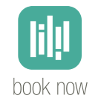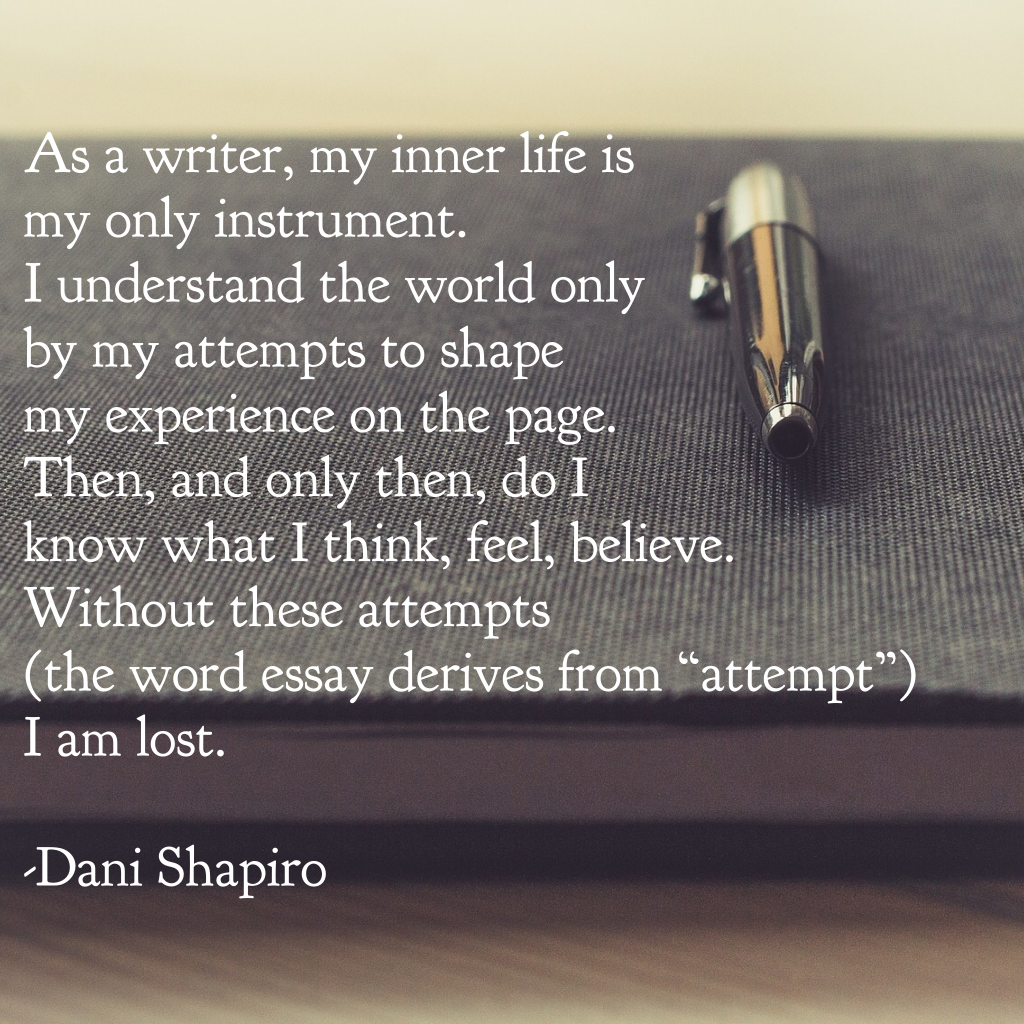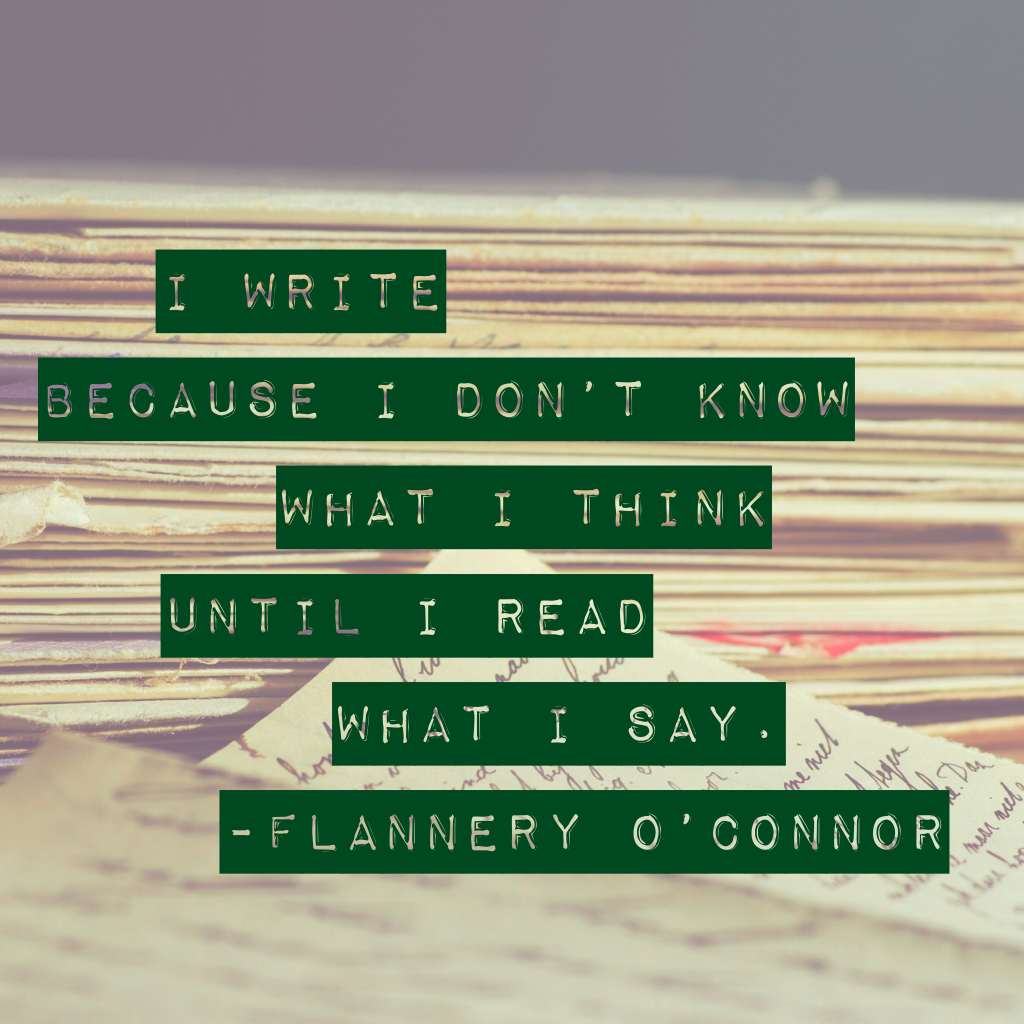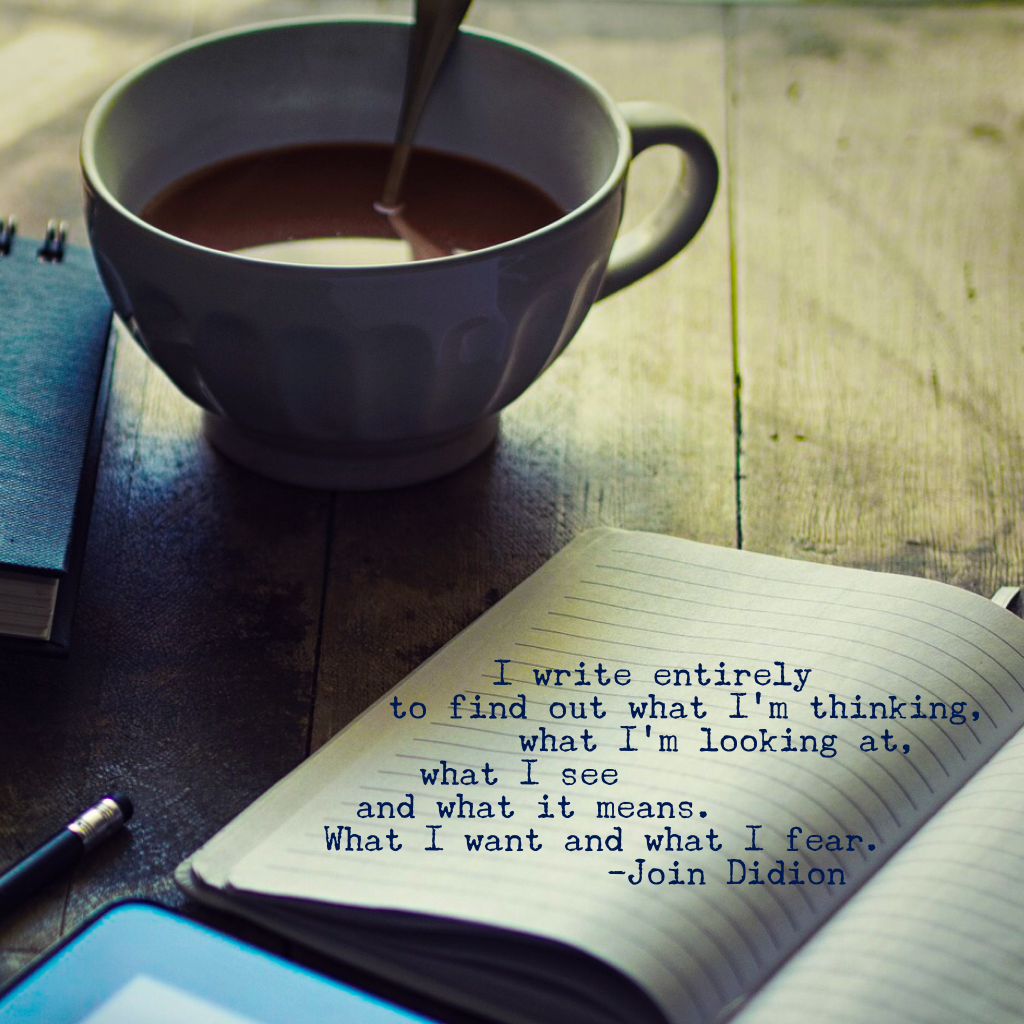
BLOG
The secret behind your post-election writer's block
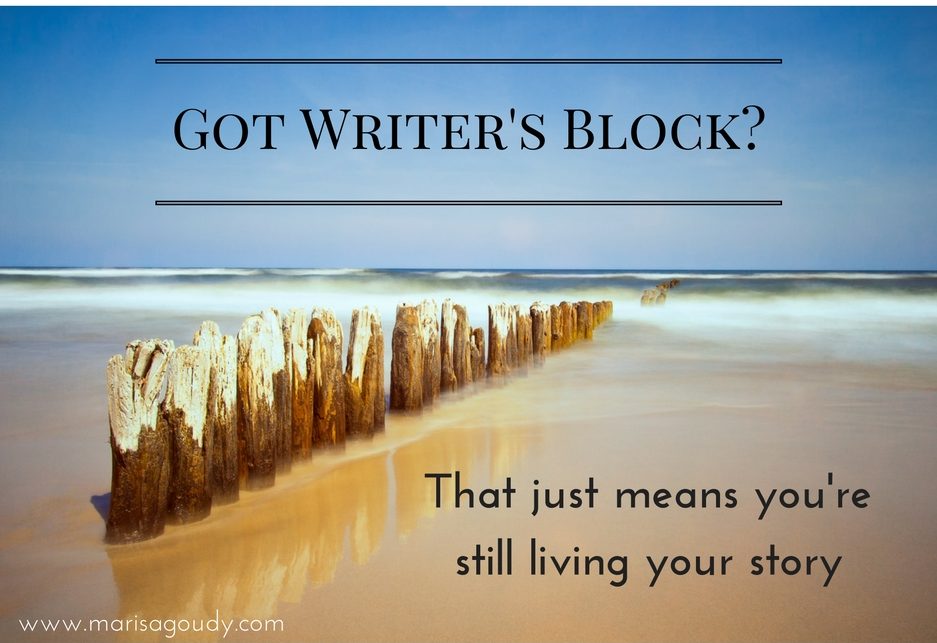 Someday, it might be fun to tell your grandkids that you had a front row seat for what will surely go down in history as one of the most infamous elections ever.
Since every person must tell the story from their own point of view, there will be hundreds of millions of versions of the 2016 presidential race, and they’ll only have one thing in common: each story will have a beginning, middle, and an end.
Someday, it might be fun to tell your grandkids that you had a front row seat for what will surely go down in history as one of the most infamous elections ever.
Since every person must tell the story from their own point of view, there will be hundreds of millions of versions of the 2016 presidential race, and they’ll only have one thing in common: each story will have a beginning, middle, and an end.
Eventually, you’ll have the perspective to understand when and how the story started (it probably wasn’t the day the winner announced his candidacy).
You’ll figure out the turning point (surprisingly, it wasn’t the day the Access Hollywood tape was released).
Already, some Americans can tell you the last line of the story: a 3 AM victory speech.
Others are still waiting to figure out how their story ends.
[tweetthis]If you have post-election writer's block it's because you're still living your story[/tweetthis]
How to be sure your 2016 election story isn’t finished yet
It's important to note that having an unfinished election story does not imply that you refuse to accept the results of the American democratic process or that you're into the whole #notmypresident thing. You could say it's more about the state of your heart than it is about making plans to move to Canada.
Here's a quick self-test to see if you're in the camp that's still waiting for an ending:
- If you have a love/hate relationship with the social media feeds and recognize that all these reactions are wrecking your health, but you still can’t look away, your story probably isn’t finished yet.
- If you’re someone who is trying to avoid all political material (except Joe Biden memes) and is focusing purely on videos of cats and puppies, then there's a decent chance your story isn’t finished yet. (And I’m really flattered you broke your own rules to read this!)
- And, if you’re someone who can’t turn journal entries or scattered notes into a complete article or blog post, your story definitely isn’t finished yet.
(Oh, and should you fit the unfinished story profile you probably appreciate pantsuits and the color blue, but that’s sort of a side issue at this point.)
Ultimately, you see the 2016 presidential race as something that’s about a lot more than the person who sits in the Oval Office. You understand that many of the the people you care about and work with can’t get back to life as usual in our post November 8th world.
You’re in touch with all of the feelings of shock, outrage, confusion, and emptiness that make you fantasize about taking to the streets or hiding under the bed. (And you probably vacillate between the two options in the space of a minute.)
But what about the persistent inner voice that says “you must write” (or podcast or try Facebook Live)?
A wise friend, a therapist and writer, who has been writing boldly into the most troublesome issues of the day kindly advised me to "give yourself a chance to wait until you regroup and heal."
My response? "Well, I guess I will be doing a lot of writing from the other side of the grave."
As a writing and storytelling coach for therapists, healers, and people in the transformation business, it’s my job to be two steps ahead. I’m here to support people who write to deepen self knowledge and publish content to support their practices. I show up online in order to model that process, but how on earth can I do that when I have no idea what I really think and I feel unqualified to offer guidance?
That sort of extra pressure only makes the writer’s block even more painful, of course.
But then, I remind myself that every honest person who has shared any insights over the last week owns the fact that they’re stumbling along unmarked paths with everyone else. Many have found a way to say… something. Few of these pieces feel complete or definitive, but that’s ok. Certainty is a lie when you don’t know the story’s real ending.
It’s enough to hold space like Dani Shapiro did, to own our disbelief and disorientation like Rob Bell did, or to apply timeless principles like Susan Piver did.
If it’s not a time for storytelling, it’s a time for story holding
What eases us through this time of confusion?
Stillness. Being aware of the mess. Feeling all the feelings. Kindness. Compassionate conversation.
We actually heal confusion by admitting that we’re mired in it and, as much as we hate to admit it, when we realize that confusion has a measure of power over us.
We collectively achieve clarity when we refuse to rush a story to a neat little ending before its time.
The good news? The wonderful news for therapists, healers, and transformation professionals? It’s your job to hold and keep safe the stories of others. Even if you’re a teacher and it often feels like you're called to perform and convey information, you’re also someone who witnesses and supports others’ growth.
The kind of work you do is about listening. It is the kind of work that asks you to respond to one person’s needs. It does not require you to fully articulate the new left wing agenda or how to reverse this new racism and misogyny sweeping America or how to decide if it's better to protest or pray.
Your work requires you to be articulate in long moments of silence and to hold space for clients going through their own dark nights, through their own stumbling confusion.
Your clients don't need to be guided to the end of their own election story. Your clients need you to help guide them back to themselves.
[tweetthis]In the #election aftermath, it might be better to be a story holder than a storyteller[/tweetthis]
And yet, it is always time for writing and self expression
Even as your work may call you to be fluent in the language of silence, please don’t silence yourself if the words are aching to come through.
I invite you to rely on your writing practice (as well as your meditation practice and other healing modalities that calm and unbind your soul) to find your way through your own confusion. And I invite you to heed the call to share those ideas when you trust the moment is right, when you trust that you must be heard.
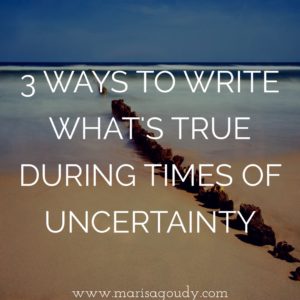 Here are 3 things I know as I write beside you through this time of uncertainty:
Here are 3 things I know as I write beside you through this time of uncertainty:
(And, yes, it's based on the Story Triangle that I use to help writers connect with their readers and their own truth. Click here to learn more. )
1. Self-focused first drafts are essential. Anne Lamott gave us permission to write “shitty first drafts.” By all means, feel free to write utter crap as long as it means you’re getting words on a page.
But please, please, please don’t allow yourself to write lousy versions of what someone else told you to think or what you assume the people want to hear from you. Write for yourself first in order to discover the truths within you.
2. Keep your audience in mind. What does your reader need from you? Why are you writing in this particular public forum? The territory you cover on a Medium post will likely be very different that the ideas you share on your business blog.
Know your platform and know its audience. When you get that SFD into the final draft, it needs to be re-crafted according to the needs of your reader. Do they need reassurance, do they need resources, do they need you to raise a ruckus, or do they need respite from all that election talk?
3. Remember that complete, compelling stories are everywhere, just waiting to be told. The great big election story is still being written as we see what a You Know Who presidency looks like, but there are countless little stories to be told along the way.
Even though many kids have taken the election results pretty hard (who else loves an elementary school kid who is still heart broken because we don't have a “girl president?), children are resilient. What stories are they living in the present moment?
Look for the ways that hope is being wrapped in a beginning, middle, and end. How are people uniting and taking positive action, despite the heavy November clouds?
Do you have stories that are begging to come through you? I can help hold space for you to tell them, support you as you clarify your ideas, and help you craft your words.
Set up a free 15 minute consultation to learn about how writing and story coaching can help you build your writing practice and your professional practice.
This Is the Worst Writing Advice I've Heard In a While
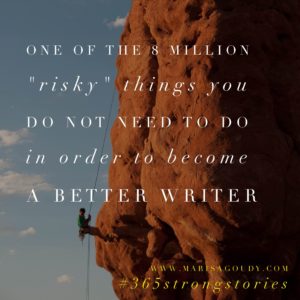 What do you imagine your favorite novelist is doing right now? Is she being romanced by some gorgeous hero? Is he resolving a generations-long family feud? Perhaps the person who writes those best sellers you love to take to the beach is on a two week bender that will be resolved with a trip around the world to find herself.
Nah. Most likely she’s updating her Facebook page and booking flights for her next appearance at Barnes and Noble somewhere outside of Chicago.
What do you imagine your favorite novelist is doing right now? Is she being romanced by some gorgeous hero? Is he resolving a generations-long family feud? Perhaps the person who writes those best sellers you love to take to the beach is on a two week bender that will be resolved with a trip around the world to find herself.
Nah. Most likely she’s updating her Facebook page and booking flights for her next appearance at Barnes and Noble somewhere outside of Chicago.
And what about your favorite blogger? Is he saving a kitten from a tree? Is she landing an agent to make that blog into a book? Maybe that writer you love to see in your newsfeed is water skiing in the Mediterranean while contemplating the next viral post.
Doubtful. She’s probably trying to scrub the mysterious sticky spots off the counter so she can put down her laptop and get 200 words down before the family comes home and everything goes from messy to noisy and messier.
As a writing coach, I get to give my share of writing advice. I also get the chance to hear what other writers and non-writers say about how to make the process easier and how to produce more engaging stuff.
Some of that advice is brilliant and I do my best to embody it so that I can offer my own version of it. And some of it makes my skin crawl.
Myth: Your content isn’t engaging your audience so you must be a boring person
Recently, a professional who keeps a blog to promote her business was brought to tears by a coach who declared that if your writing isn’t connecting with people it must mean you have a boring life. The advice was to go out and take some risks. And then, I guess, come back and "wow" people with how adventurous and special and fabulous you are.
This is lazy advice. Clearly it’s also damaging advice. And, in this writer’s opinion, going bungee jumping or visiting Tahiti or going on a blind date aren’t necessarily going to make you a better writer.
If you feel that your writing isn’t connecting with people you don't need more "material." Instead, you need to give yourself time and permission to do something with your human moments.
Readers don’t seek high drama and “amazing” tales when they're looking to heal a broken heart or connect with the guy sitting beside them on the couch. They need to see what's possible in their everyday lives. They need to see how life can be a little more beautiful or bearable before they’re going to care about how bold you are.
"Go be more interesting" is the kind of counsel offered by someone who is afraid of the process of meeting yourself in the silence of the page.
Trust the magic that happens in the little moments of life. To make a connection at the simple, truthful level of the human heart you have to remember that this beautiful organ almost always beats along in the most perfectly mundane way.
When you're writing your next blog post, meet your ideal clients where they are. Don’t drag yourself up a mountain just to find them.
Be who you are. Write about who you are in your everyday mess and everyday loveliness and everyday struggle. That's what will make readers care. That's what it means to connect.
Learn how to tell real stories that matter to you and to your ideal client in the You, Your Stories, and Your Audience ecourse. Doors are open now!

Refame: Those who know better than to do every day, teach
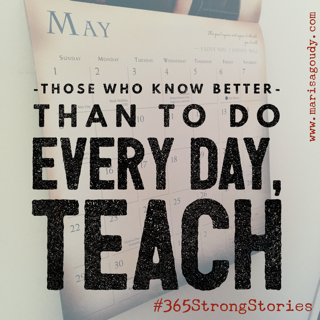 Everyone has heard that snarky line “those who can’t, teach.” The updated version is said with even more venom: “those who can’t, coach.”
I have no use for the throwaway cruelty that lies at the heart of both phrases. Such statements either come from self-loathing or the petty judgement of those standing outside the arena. “Not good enough” never serves anyone and never gets anything done.
Everyone has heard that snarky line “those who can’t, teach.” The updated version is said with even more venom: “those who can’t, coach.”
I have no use for the throwaway cruelty that lies at the heart of both phrases. Such statements either come from self-loathing or the petty judgement of those standing outside the arena. “Not good enough” never serves anyone and never gets anything done.
And think about it for a moment - this whole idea has a flip side: “those who can, must.”
Whether you’re teaching or doing, “can’t” and “must” are limiting and damaging
My 2016 project, #365StrongStories, has taught me a great deal about what it means to do something every day just because you can. It very quickly becomes a dangerous "should."
I’m a born writer. It’s what I do for work and for fun. But when writing becomes a massive obligation - I must because I can, I must because I committed, I must because I am not good enough if I don't… Then you run the risk of making every word a punishing, impossible chore.
In the process of all this doing, all this daily writing, I remembered why I took up teaching and coaching storytellers and writers. It wasn’t because I couldn’t do the writing myself but because it doesn’t make sense for me to do that full time. My creative resources won’t stretch that far. And I do not think they are supposed to.
Remember the value in teaching and coaching others
When Melvin Varghese of Selling the Couch interviewed me, I had a chance to share my insights into why storytelling is important to clinicians in private practice and how to use it to connect to clients. I also talk about making a sane, compassionate commitment to your writing practice.
As I listened back on our conversation, I was struck by the value that lies not just in doing but in supporting the process of those who are trying to find their own way. Humbly and gratefully, I fell just a little bit more in love with the work I get to do.
Save your resources for the stories that matter. Support your creative process by guiding others. When all else fails, support your creative process by pulling out the earbuds and going for a walk as you listen to someone else discuss her craft.
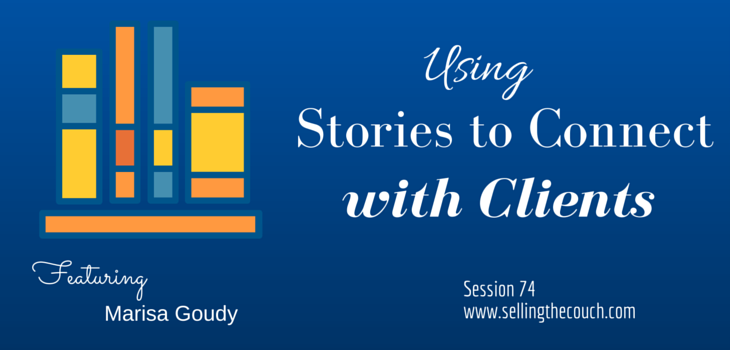
“I don’t have time to write!”: the Tough Love Answer and the Soul-Level Response
 Sovereign Standard, Issue 35
What’s the reason why people get this close to inviting me to be their writing coach and then press the pause button?
Sovereign Standard, Issue 35
What’s the reason why people get this close to inviting me to be their writing coach and then press the pause button?
“I really want to give this content creation process the attention it deserves, and I am just not ready to do that yet.”
Whether you're looking to hire a writing coach and editor or whether you're working solo on all the website content, blog posts, and guest posts, you feel the same pressure: “I don’t have time to write!”
The tough love answer to “I don’t have time to write”
 Because I like you, I will tell you that, even as a writer, I understand this squeeze. Granted, for me the problem is “I don’t have time to write enough,” but the principle is the same.
Because I like you, I will tell you that, even as a writer, I understand this squeeze. Granted, for me the problem is “I don’t have time to write enough,” but the principle is the same.
There’s so much you want to say, so much that you want to explore… there just aren’t enough hours in the week.
And because I love you, I'll listen to your “not enough time!” lament. Then I will then ask you what your goals are - professionally, creatively, personally.
You’ll think I’m changing the subject and giving you a chance to tell me about all the other really neat stuff that’s more important than your writing practice including your plans to:
- Start a podcast
- Build a membership group
- Develop a product and make money while you sleep (finally!)
- Work your way to Oprah’s couch (because it’s the goal even when you need cable to see it)
I will be so excited to hear about everything you've got cooking! And then I am going to say, because I really believe you have valuable insights that will earn you income and recognition: but how are you going to manifest all that without a writing practice?
Praying that you don’t think I’m telling you to put your dreams on hold while you do something "impossible" (dedicate three hours or more per week to the process of writing), I will remind you:
- A powerful podcast grows thanks to the strength of its show notes and the written content that attracts readers and converts them into listeners.
- A membership group that is all audio or video based will disappoint people who prefer to read information and it will never be a fully searchable, useful resource for anyone.
- Even a sound and visual-based product needs a written component too - and it needs to be marketed with rich content that tells a story.
- Last time I checked, the way people like you and me get on Oprah is by writing a really awesome book.
The soul-level response to “I don’t have time to write!”
“Because it will forward my business” and “because I need to boost my visibility to share my message” - these are great reasons to develop and stick with a writing practice.
But are knowing it's good marketing strategy and understanding my points above really enough to get you to set writing dates with yourself?
"Because entrepreneurship" has never been a strong enough reason to get me to show up to this blog week after week. No promises of big money or fame has inspired me to fill all those little black journals.
There has to be something more to this writing thing. There's a deeper value that compensates the time and the energy and the devotion you must lavish on the writing process.
But, of course, a writer says writing is "the thing"
Now, taking writing advice from a writer - someone who needs to write to make sense of this heartbreaking, ecstatic work of being alive - it’s a dicey thing.
Admittedly, I’m a person who would ask a dozing seatmate on a packed New York City commuter train for a pen because a 90-minute trip without writing implement is unendurable.
It's good to have crazy scribes like me out there (unless you're a cranky commuter). We're here to do the writing for you, right?
The copywriters and the writing coaches in the world - we're good, but we're not that good. We can help you get clear on what you really want to say. We can make you look good on paper. We can empower you to feel like a "real" writer and not just somebody blogging for attention.
But, you need to touch the words at some point in the process. You cannot outsource the practice of writing itself - the discipline of it, the ritual of it, the insights and serendipitous connections that spring from it. Well, you could, but then you'd miss out on all sorts of untold magic.
When you delegate the entire writing process you lose tremendous opportunities to explore and expand your own thoughts. As a creative entrepreneur, as a clinician or healer who wants to make a difference in the world - you need access to your own brilliance.
Writing gives you a direct path into your own most vital wisdom.
Writing = thinking, understanding, feeling
Need some inspiration to turn the writing chore into a writing practice? Meet Saundra Goldman and her #continuouspractice project and join the community of people who show up each day to the practice that matters.
Ready to make time for the writing your business needs you to do? Let's talk about how writing coaching can help you create a practice that works for you.
And, even though my "brave" writing is mostly being confined to my journal, I'm still inspired by the Bravery Blogging Project. This week, it felt courageous to ask other great writers to speak for me!
Can you be vulnerable and write “I don’t know” on your business blog?
Sovereign Standard, Issue 34 The writer looks like she is sitting at a keyboard or scribbling furiously in a journal. She seems to be occupying the same space and time as everyone else in the room, but, in reality, she’s exploring territory that she can explain, but never let you view directly.
The writer looks like she is sitting at a keyboard or scribbling furiously in a journal. She seems to be occupying the same space and time as everyone else in the room, but, in reality, she’s exploring territory that she can explain, but never let you view directly.
Whether it’s fiction or theory or even marketing copy that comes from the heart, she’s deep in her own inner landscape. This marvelous space is only limited by the scope of her own imagination and knowledge.
This private world is not infinite. Instead, it’s an eternally elastic territory. The borders are pushed outward by everything she learns and by every experience that invites her to grow.
And yet, there are limits. The writer will reach her edge. Then what?
The Blogger’s Dilemma: The Question Without an Easy Answer
When I worked on the first draft of this week’s blog post, I found myself writing into a question without an answer.
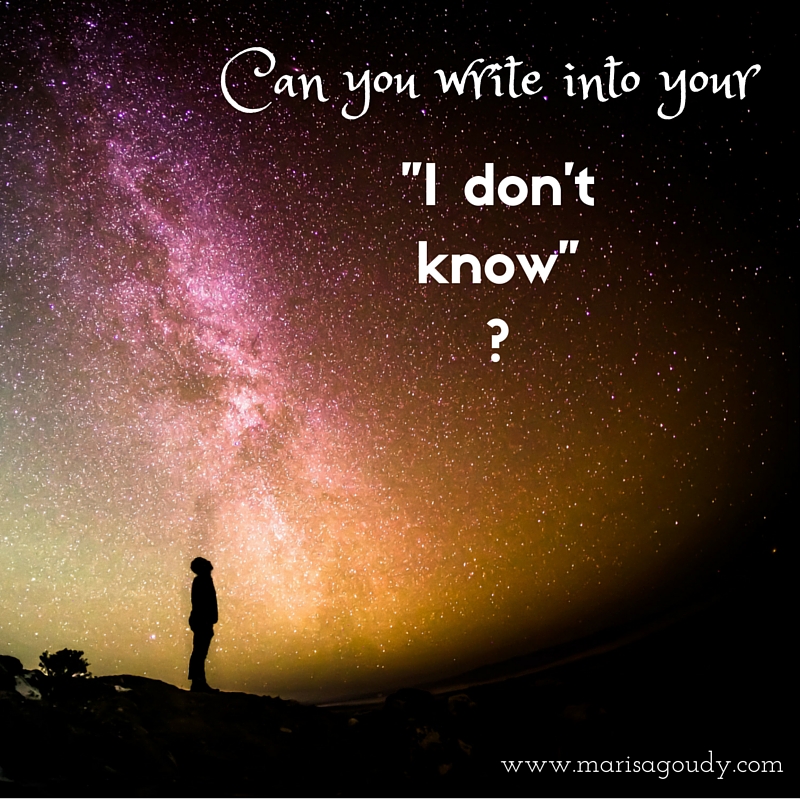 It was something so close to my “expertise” that I was shocked when I hit a big “I don’t know…”
It was something so close to my “expertise” that I was shocked when I hit a big “I don’t know…”
Often the best questions don’t have ready answers - that vast unknown is the seed of a book, a career, or a life's passion. By the same token, the best blog posts don't necessarily follow the "proven" formulas.
But, in my case, it felt like I should have an answer (and I don’t even let myself use the word should). After all, I was writing about storytelling and this was “just” a blog post… Finding myself at the edge of my frontier of knowledge was as unexpected as it was unsettling.
Sitting quietly in front of a Word doc, I felt uncertain and exposed.
I felt horribly vulnerable - even though no one ever needed to know that there was something really important about storytelling I couldn’t write about with ease.
And then, the magic of the writing practice kicked in: describing the view from my own intellectual edge became more important than the expertise I thought my readers would need.
This is the Vulnerability Business, right?
Last week’s post was about being in the vulnerability business. If you seek to transform lives and make this world more beautiful, bearable, or bold, you have a stall in the marketplace of vulnerability.
You hold space for your clients’ shame and uncertainties. And you strive to recognize vulnerability when you see it - starting with your own.
The writing process gives you a perfect window into your own vulnerabilities. After all, it’s about showing people how you organized ideas and crafted them to be understood by others. It's about being seen.
Something that wasn’t in the last post - writing can also expose what you might perceive as your “weaknesses.”
Remember, before Brené Brown taught us that “Vulnerability is the birthplace of love, belonging, joy, courage, empathy, and creativity,” most of us just equated vulnerability with weakness.
The gift of “I don’t know”
That unexpected “I don’t know” dropped me into the “fraud, fraud, fraud” pit. I’m sure I needn’t tell you that no decent writing has ever been produced in that despairing hell hole.
Let’s take a moment here to celebrate one of the many gifts of the writing practice: you can write your way through despair all the way to retrospect - sometimes in the same writing session!
Now, I can see “I don’t know” as a tremendous gift.
It’s an invitation to see things in a new way. It’s an opportunity to forgive myself for being a mere mortal who is still learning every day. It’s a chance to hit pause and do some really delicious research - and perhaps even read those books on writing that I love to buy but never have time to read (because it would eat into writing time, of course).
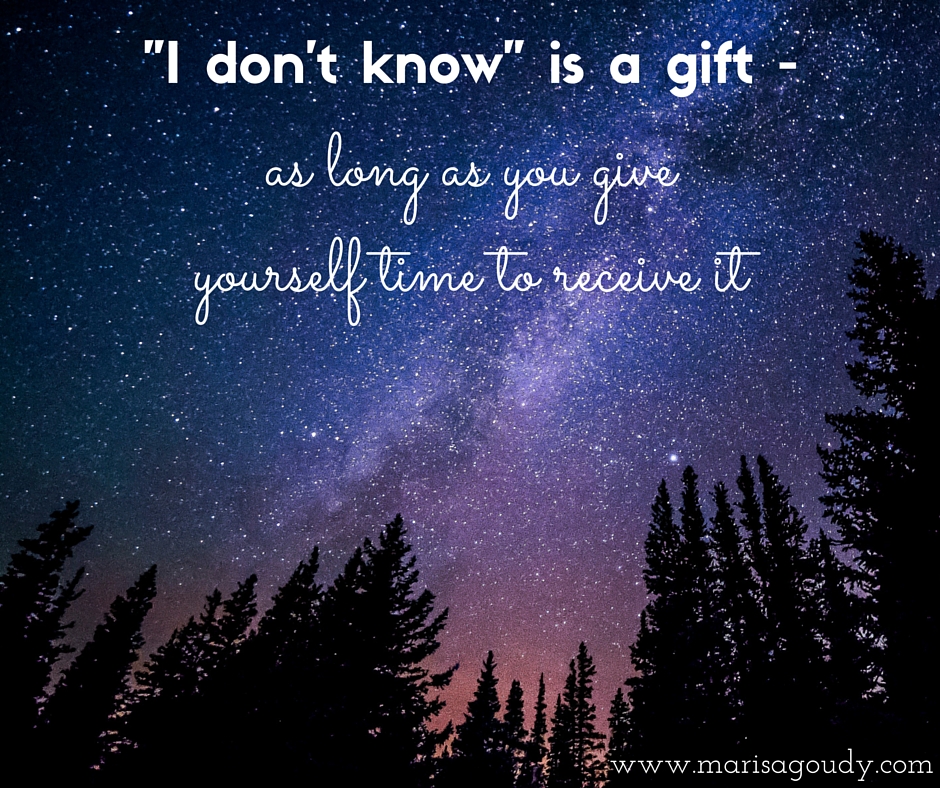 But what if you don’t have time receive the “I don’t know” gift?
But what if you don’t have time receive the “I don’t know” gift?
New perspective, self-acceptance, mindful pauses. Lots of people tell you how wonderful they are.
Truth is, it is hard to see all the opportunities in “I don’t know” when you simply don’t have the time to wander and wonder and expand the bounds of the known world.
There is only so much writing time per week. This time is not meant to be lavished on research or stumbling into terra incognita. It’s not meant to be spent on Facebook either, but that's another story.
So, what happens when you write yourself into an "I don't know" shaped corner but you just need to hit publish?
4 Ways a Writer Can Respond to an Unexpected “I Don’t Know”
Research. The universe just may be telling you that it IS ok to skip this week’s post and put your writing time into developing your own answer to that big, scary question.
(Admittedly, this week I told the universe I would get back to it about expanding my mind after I found a way to write something worth publishing, baked cupcakes for my 6 year-old’s birthday, and finished the outline for my new membership group. This may be an instance of “do as the writing coach says, not as she does.”)
Release. “Release” may be about skipping or delaying a post (see above). Losing sleep or publishing something that isn’t ready just because it’s supposed to be on the editorial calendar is never in your best interest.
(Personally, I find it almost impossible to break the publishing promise I've made to myself. I often choose to understand “realease” as letting go of the troublesome topic and allowing another idea to emerge.)
Repurpose. Look back at past posts, particularly material that appeared on old websites or on guest blog posts. Redo the intro and the conclusion and let yourself off the “must create original material” hook. Remember: this is always an option.
(Do you even remember what you wrote last year? Chances are there's real gold there. Looking back to your past posts isn't cheating - it's using all your resources wisely.)
Reach out. As I wrote this late into Wednesday night, I whined to my husband about being stuck in the blogging vortex. While I was happy that I had been able to release the original idea and repurpose the feelings that “I need to do more research” stirred up, I had well over 2000 words of wandering wonder. All I wanted was an intro, some useful content, and a compelling Invitation to Action! That was when the light went on - if only I had a writing coach!
All day long, I look at clients’ snarled up brilliance and help them pluck out the brightest, most evocative ideas and stories. It’s nearly always impossible to get perspective on your own work. If you can relate to this story, reach out to me and we’ll see how I can help you uncover your most brilliant thoughts.
*****
This week’s post was inspired by many factors including my big scary “I don’t know,” the conversation that last week’s vulnerability post has generated, and the Bravery Blogging Project I stumbled across this week (thanks, Molly!).
Illana Burk of Makeness Media is looking for her community to make “Real, original, difficult content.” I’m new to their world, but finding yet another circle of people who want to dive deep into an idea and risk writing outside the blogging “shoulds” stretches my mind in a wonderful new way. And it makes me feel like I can keep blogging about the “I don’t know” stuff and it encourages me to ask you to do the same.

